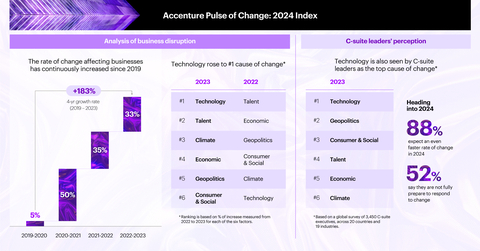Businesses Anticipate Unprecedented Rate of Change in 2024, New Accenture ‘Pulse of Change Index’ Shows
Fueled by Generative AI Advances, Technology Leaps from No. 6 to No. 1 Cause of Business Disruption in One Year, According to Key Indicators
While Optimistic, C-Suite Leaders Question Their Readiness to Respond

Business leaders faced an all-time-high rate of change in 2023 and now expect it to accelerate further in 2024, according to Accenture’s Pulse of Change: 2024 Index, released today ahead of the World Economic Forum Annual Meeting in
The new annual Index ranks six factors of change affecting businesses—Technology, Talent, Economic, Geopolitical, Climate and Consumer & Social—using a range of key business indicators, such as labor productivity and IT spending. It then compares this data to a survey of 3,400 C-suite leaders on how they view the impact of each factor on their organizations, as well as their preparedness to respond.
The Index indicator analysis reveals that technology disruption increased the most in 2023, rising to No. 1 from No. 6 in 2022, catapulted by advances in generative AI. In the survey, C-suite executives also ranked technology as the No. 1 cause of change.
According to the indicator analysis, Talent was the No. 2 cause of business change (including issues such as skills shortages and lack of employee engagement); yet in the survey, C-suite leaders ranked Talent at No. 4. However,
The Index indicator analysis found that overall, across all six factors, the rate of change has risen sharply since 2019—
“The level of change has dramatically increased over the last few years, and it requires a structural change in how businesses operate—incremental changes in ways of working and performance are no longer sufficient to compete,” said Jack Azagury, Group Chief Executive—Strategy & Consulting, Accenture. “The most significant source of change and disruption—technology—is also the key to this structural change. We believe that the companies that will succeed in the next decade are those that embrace a strategy of continuously reinventing every part of their business using technology, data and AI, including harnessing the power of generative AI, and ensuring their people are at the center of their transformations.”
The C-suite survey reveals that rapid pace of change holds continued potential for wide-ranging impact on leaders in the year ahead:
-
A striking
88% of leaders anticipate an even faster rate of change in 2024. -
60% see change as an opportunity, and68% expect revenue growth to accelerate in 2024. -
Despite their optimism, more than half (
52% ) say they are not fully prepared to respond to the change they will face in the 2024 business environment.
Technology disruption seen as opportunity, with caution about responsible use
Sixty-one percent of C-suite leaders expect the pace of technology disruption to accelerate even further in 2024, and
However, nearly half (
Research Methodology
Accenture’s Pulse of Change Index compares findings from two major inputs.
1. An analysis of change affecting businesses globally, caused by six major factors:
- Technology, which is based on indicators such as IT spending and VC funding on emerging technologies, reflects the pace and scale at which technologies, such as generative artificial intelligence, are adopted and implemented;
- Talent, which includes indicators measuring the risk of labor shortages, level of employee engagement, wage costs and labor productivity, reflects the overall talent environment from a quantitative and qualitative perspective;
- Economic, which includes macroeconomic, financial and business indicators, reflects the overall economic disruption, financial volatility and business outlook;
- Geopolitical, which includes indicators measuring geopolitical risk, number of economic sanctions and number of cyberattacks, reflects changes in war and conflicts, trade tensions and cybersecurity;
- Climate, which is based on indicators such as climate-related disasters and direct economic loss attributed to natural disasters, looks at the risks related to environmental issues, as well as the financial cost implications of climate-related regulations for businesses;
- Consumer & Social, which includes indicators assessing social unrest and household savings, reflects the overall social climate as well as consumers’ confidence in the future.
To evaluate both the rate and nature of change, the Index computes, through AI-led data modeling, 40 proprietary and public data series covering 2019 to November 2023 from leading institutions such as the Organization for Economic Cooperation and Development (OECD), International Monetary Fund (IMF) or the United Nations Sustainable Development Goals (UN SDG). It quantifies the change businesses are facing and determines the rankings of the top six causes of change by comparing their respective increases from 2022 to 2023. This approach identifies the specific change factors that had the most substantial impact on the overall rate of change in 2023.
2. A global survey of more than 3,400 C-suite executives, conducted from October 2023 to November 2023, across 20 countries, 19 industries and a full range of corporate functions, to compare their perceptions of change with the analysis of business disruption.
About Accenture
Accenture is a leading global professional services company that helps the world’s leading businesses, governments and other organizations build their digital core, optimize their operations, accelerate revenue growth and enhance citizen services—creating tangible value at speed and scale. We are a talent- and innovation-led company with approximately 743,000 people serving clients in more than 120 countries. Technology is at the core of change today, and we are one of the world’s leaders in helping drive that change, with strong ecosystem relationships. We combine our strength in technology and leadership in cloud, data and AI with unmatched industry experience, functional expertise and global delivery capability. We are uniquely able to deliver tangible outcomes because of our broad range of services, solutions and assets across Strategy & Consulting, Technology, Operations, Industry X and Song. These capabilities, together with our culture of shared success and commitment to creating 360° value, enable us to help our clients reinvent and build trusted, lasting relationships. We measure our success by the 360° value we create for our clients, each other, our shareholders, partners and communities. Visit us at www.accenture.com.
Copyright © 2024 Accenture. All rights reserved. Accenture and its logo are registered trademarks of Accenture.
View source version on businesswire.com: https://www.businesswire.com/news/home/20240112833343/en/
Francois Luu
Accenture
+33 660 53 8428
francois.luu@accenture.com
Sam Hyland
Accenture
+ 1 917 452 4801
samuel.hyland@accenture.com
Source: Accenture







